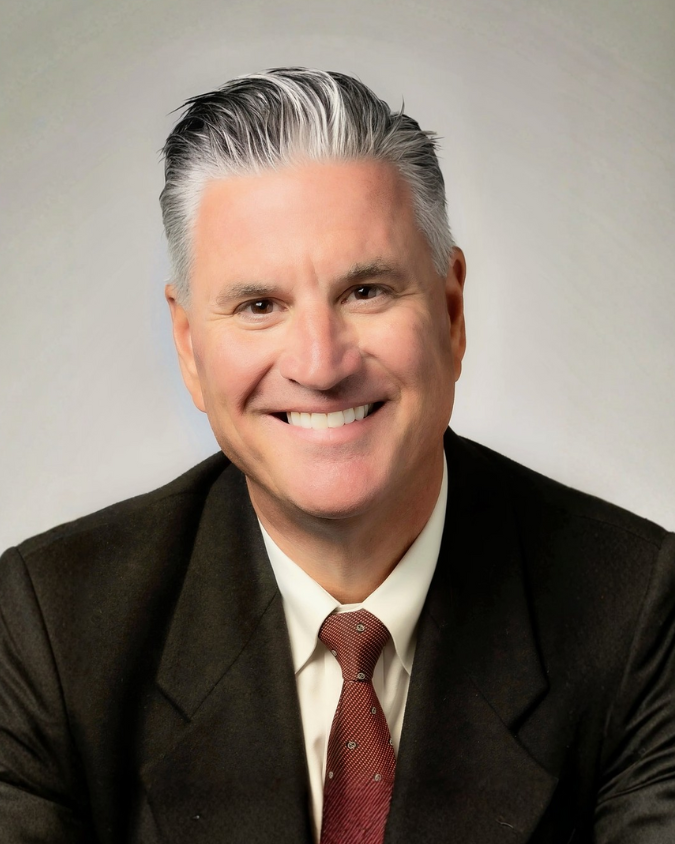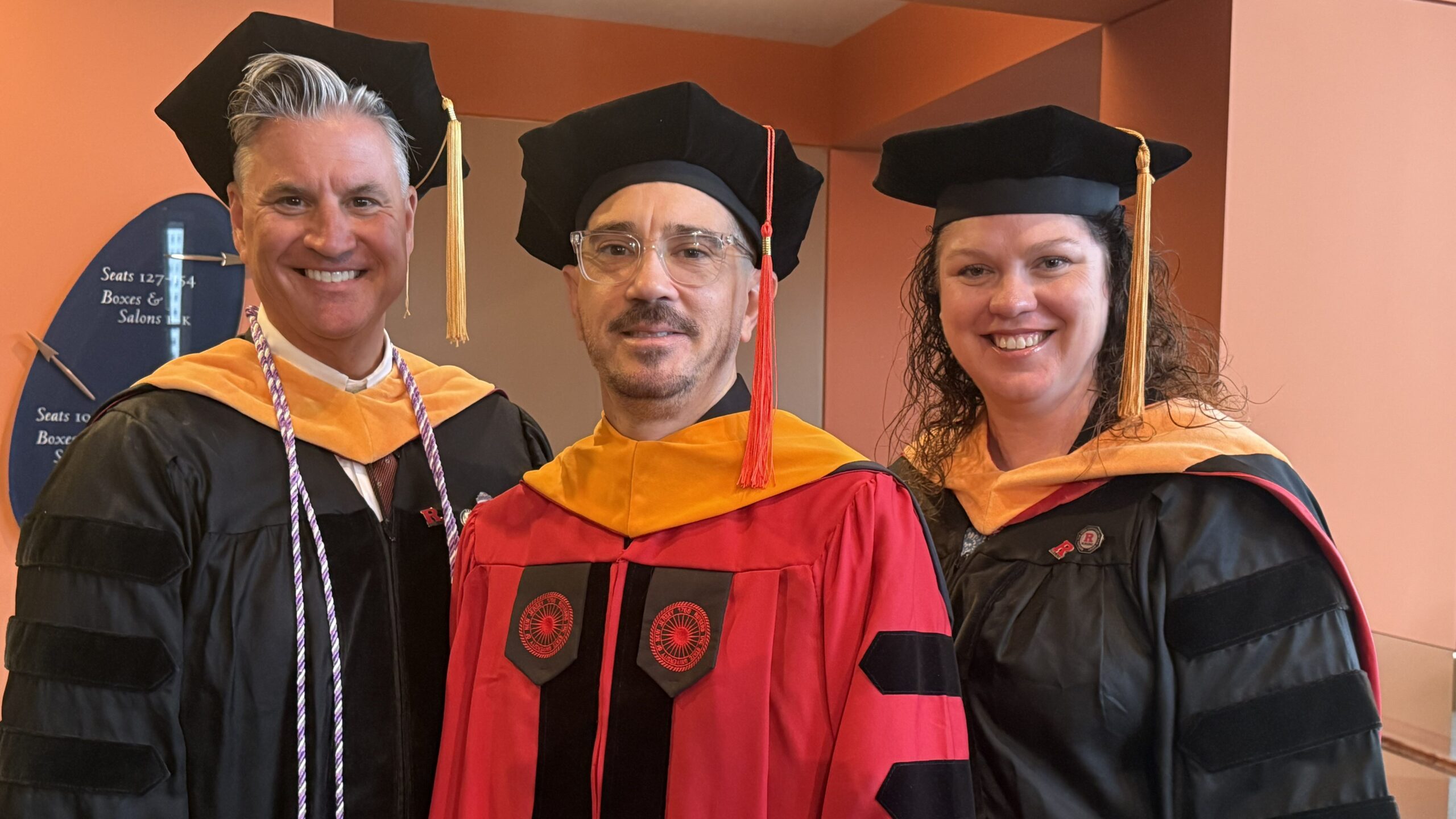Shaping the future of Nurse Anesthesia at Rutgers: A conversation with Professor Thomas Pallaria
October 16, 2025

Dr. Thomas Pallaria (front, far left) takes a break with CRNAs.

Thomas Pallaria (DNP, APN, CRNA) is an assistant professor and the program director of the Nurse Anesthesia education program at Rutgers School of Nursing. As he celebrates 25 years in clinical practice, Pallaria reflects on his career, the evolution of the field, and how Rutgers continues to prepare the next generation of Certified Registered Nurse Anesthetists (CRNAs) for success.
Q: You’re celebrating a milestone anniversary this year. When did you begin your clinical career as a CRNA?
Thomas Pallaria: I began my clinical career as a CRNA in September of 2000, at the same time my third child was born. As you can imagine, it was a memorable time welcoming my third child into my growing family.
Q: How have your 25 years of clinical practice shaped the way you prepare the next generation of CRNAs at Rutgers?
Pallaria: I think at my core, I have maintained the ability to remember what it was like to not only be sitting in a classroom at Columbia learning the science of anesthesia for the first time, but also walking into an operating room as a brand-new learner, trying to navigate my way through a strange and highly dynamic environment. Since co-founding our school’s program in 2004, I have drawn on those early experiences, as well as countless memorable times in the operating room as a practicing CRNA, to inform my teaching.
Clinical stories serve to add a rich layer of explanation to each didactic topic, and being able to apply real-life experiences to hours-long classroom lectures is essential not only for creating a realistic environment in which to learn, but also for solidifying the scientific concepts and their application to our patients. Ultimately, all of this is about the patients.
Q: What do you see as the biggest opportunities and challenges facing CRNA education today, and how is Rutgers positioning students to meet them?
Pallaria: There are endless opportunities when educating critical care nurses to become CRNAs. As our profession continues to grow in numbers and reputation, the continued advancement of the vital role that we play in perioperative medicine is supported by our learners’ passion for advancing their knowledge and skills, creating a natural progression towards ensuring that all patients across the country have access to expert, compassionate anesthesia care. Rutgers nurse anesthesiology curriculum ensures that our doctoral students enter their residency with all of the didactic must-haves, which, combined with their extensive experience as critical care nurses, elevate the point-of-care learning and add to the anesthesia service delivery across our 26 clinical partner institutions in NJ and NY. As far as challenges go, they are simply opportunities with additional circumstances!
Q: What advice would you give to new CRNAs about building longevity and resilience in such a demanding role?
Pallaria: Building personal and professional resilience is a very difficult part of being a CRNA; however, it is absolutely necessary for enjoying a long and fulfilling career. My advice is simple: have courage, be flexible, be respectful, take advantage of every opportunity that comes your way, and, most importantly, know your worth.
Q: Looking back over your career, what has changed the most in anesthesia practice since you started?
Pallaria: A lot has changed over the past 25 years. If I had to pick two of the most significant changes, it would be the evolution of nurse anesthesiology education and the proliferation of CRNA practice across the entire country. Back in 2000, when I graduated with my master’s degree, the program length at that point was roughly two years. After the profession adopted the doctoral degree as the entry-to-practice standard, graduate students pursuing a career in nurse anesthesiology now complete far more credits, a more robust clinical residency, and take a minimum of three years to earn their degree, making them eligible to sit for the National Certification Examination (NCE).
Additionally, when I graduated, I could practice without having completed my boards; now every new graduate in nurse anesthesiology must pass their boards in order to practice as a CRNA. We are all 100 percent board-certified. From a clinical perspective, in my own personal experience upon graduation, I had a very limited number of locations to choose from to begin my career as a CRNA. And in those places, the CRNA team typically consisted of no more than a dozen CRNAs. Now, every major health system, tertiary care facility, and ASC in my neck of the woods relies on large teams of CRNAs to provide safe, efficient anesthesia care for all patient populations.
Q: Can you share an experience that has stayed with you and shaped the way you approach your career today?
Pallaria: This is probably the hardest question, so I do appreciate that it was saved for last! There are so many experiences across so many different categories that combine to create a career. I could talk forever about clinical experiences with such an enormously diverse patient population, or I could share one of what seems like a million interactions that I have had with one of my nurse anesthesia residents, which I am confident made a lasting impact on them. But looking back over the last 25 years, with more ups and downs than anyone could count—or expect, for that matter —I would prefer to share my personal experience with mentorship.
I have mentored many young professionals over the past 20-plus years, but what is truly significant to me are the individuals who took the time to mentor me. One of the first was arguably the greatest CRNA to ever practice, and his name was John Garde. Although I never met him in person, he generously shared his vast knowledge of nurse anesthesia education when the Rutgers program was being formed. Without his constant encouragement and calm support, I’m not sure if the program would have gotten off the ground.
I’ve also been fortunate to have had a mentor for more than a decade in Dr. Susan Salmond (EdD, RN, FAAN, ANEF)—who was one of the best deans anyone could ask for. Not only did she help guide the success of the nurse anesthesia program, but her steadfast support has been invaluable to my own growth in academia and the CRNA profession, and her guidance continues to this day. In addition to these two pioneers, I have had several other mentors along the way. They know who they are, and I would not be answering these questions today without their care and leadership.
About the Nurse Anesthesia Program at Rutgers School of Nursing
The Nurse Anesthesia DNP program at Rutgers School of Nursing is the only doctoral program in New Jersey preparing nurse anesthesiologists at the highest level of practice. With a 91% first-attempt pass rate on the National Certification Examination for all graduates, a 100% employment rate, and excellent student and employer satisfaction data, the program prepares CRNAs for a full scope of practice in a variety of settings. Learn more about the program.

Pictured at a Rutgers School of Nursing graduation celebration (L-R) are Nurse Anesthesia program leaders Dr. Thomas Pallaria, assistant professor and program director; Dr. Michael McLaughlin, assistant professor and assistant program director; and Dr. Maureen McCartney Anderson, assistant professor and assistant program director.
For media inquiries, please contact Lynn McFarlane at lynn.mcfarlane@sn.rutgers.edu
